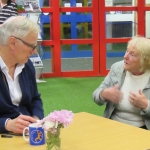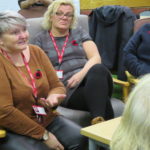Bearing witness to the value of people’s lives
 The United Nations Special Rapporteur on Extreme Poverty is currently touring the UK. Church Action on Poverty arranged for him to visit Cedarwood, a project we’ve been working with on the Meadow Well estate in Newcastle. Our Communications Manager Liam Purcell was there to listen as local people told their stories to the Rapporteur.
The United Nations Special Rapporteur on Extreme Poverty is currently touring the UK. Church Action on Poverty arranged for him to visit Cedarwood, a project we’ve been working with on the Meadow Well estate in Newcastle. Our Communications Manager Liam Purcell was there to listen as local people told their stories to the Rapporteur.
Professor Philip Alston, the Special Rapporteur, is in the midst of a packed tour of the UK. He is meeting government agencies, charities, academics, and others, to assess and understand the nature of poverty here in 2018. (You can follow what he’s doing via his website.)
We wanted to make sure he had the opportunity to hear directly from the real experts – people with lived experience of poverty. We knew that the Cedarwood Trust would be a good place to visit because Church Action on Poverty North East has had strong links there for many years; and because we have already helped local people tell their stories through our Voices from the Margins project.
Professor Alston and his team spent an hour on the evening of 7 November, listening attentively to the experiences of local people, and the views of the staff and volunteers at Cedarwood and other local projects.
We heard about the long history of the Meadow Well estate, set up to house people after slum clearances in the 1930s, and always seen as “one of the forgotten places” by the people who lived here. The Cedarwood Trust has been here for local people for decades. David Peel, chair of Church Action on Poverty North East, described how people have always come to Cedarwood “to bear witness to the value of their lives”.
Margaret Reynolds, a Church Action on Poverty member and community activist who lived on the estate for 52 years, shared her story. She remembers powerful community action in the area 30 years ago, sparked by Church Action on Poverty – but worried that there is no appetite for collective action any more. She has seen authorities get rid of local activities, break up communities, and “dump” people in other areas with no resources.
Now she says there is nothing for young people to aspire to; the only jobs available are in retail or call centres, with no way to build a future. A worker from the Phoenix Detached Youth Project told the same story, saying that there are training schemes for young people but no actual job opportunities at the end of them. He talked about the damaging impact of cuts: the local authority employed 18 youth workers in 2010, and now there are none.
Many local people also spoke about how there is no sense of identity or belonging. Denise and Andrea, two community organisers, had found that the majority of local people felt that they had no voice and no say in decisions that affect them. Other people pointed to the tall fences around houses on the estate as a visible symbol of the growing individualisation and atomisation of people’s lives. The fences separate people from one another, and people are not allowed to change the colours, which clearly mark out which homes are council houses and which belong to housing associations.
But the biggest concern for Cedarwood and for most local people was the impact of the benefits system on people’s lives: particularly sanctions and the roll-out of Universal Credit. Professor Alston described to people the assurances he had heard from the government about protections built into the system. The response from almost everyone in the room was hollow laughter.
Phil McGrath, chief exec of Cedarwood and Vice Chair of Church Action on Poverty, put it very simply:
“The real problem is that people have no money. Benefit changes mean that they now have even less no money.”
He highlighted how people in Meadow Well are forced to pay the Bedroom Tax because there are no smaller properties available for them to live in – sweeping them into debt.
David, a local resident, talked about how he had been sanctioned three or four times, sometimes for up to two months, because he was searching for work but not registering the searches properly on the website. Staff and volunteers confirmed that the system for logging searches is complex and requires a high level of IT literacy. David asked for a hardship payment because he is diabetic, and the staff refused to believe him.
There were many stories of hostile and dehumanising treatment by jobcentres and benefits staff. Denise described how the first thing you see when applying online for Universal Credit is a warning that you could be sanctioned for up to three years… A young person had been forced to find work immediately after having a kidney removed… A local man had been threatened with eviction and having his children taken into care, four days after his wife’s funeral… People are afraid to complain because they know they could be sanctioned and left unable to feed themselves… Security staff are threatening and abusive…
“When you have to have bouncers at the job centre, that says a lot.”
Phil McGrath also spoke about the difficulty of finding work. Despite government claims of rising employment nationally, unemployment is static or rising in Meadow Well and other parts of Newcastle. He knows people who are working five part-time jobs just to get by. It’s unsustainable.
Perhaps the strongest theme that emerged was that people are tired of having to fight the system. “Exhausted.” “Depressed. Suppressed.” “People don’t have the oomph for solidarity.” People feel they’re “treated badly because they’re from a crap area. They grow up believing they’re rubbish.”
People also wanted to highlight the great work done by projects like Cedarwood and Phoenix, and the things that local people achieve. They know that they are lucky to have a strong community centre in their area. But they say it is hard to get publicity for any of the good things that happen here.
- Follow the UN Special Rapporteur on Facebook or Twitter for more updates.
- Click here to read Church Action on Poverty’s written submission to the UN.
- Click here to read coverage of the Cedarwood conversation in The Guardian.


Reblogged this on Britain Isn't Eating!.